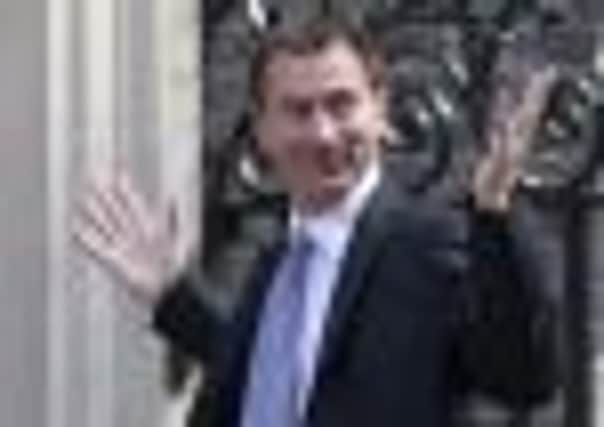Leaders: Reshuffle that risks more damage to Tory unity | Bare breasts not the shocking part


If so, it is hard to see what David Cameron hopes will be achieved by yesterday’s reorganisation of his ministerial team.
The Prime Minister’s government has been most under attack for its handling of the economy. The austerity measures required to meet deficit reduction targets have been rigorously imposed, but the expected consequent economic recovery has failed to appear. Labour opponents were quick to notice that those in charge of economic policy at the Treasury and Business department were unmoved, implying there will be no change.
Advertisement
Hide AdAdvertisement
Hide AdSuch signals as there were of shifting intentions were about more marginal economic concerns. Business lobbies have demanded increased airport capacity in south-east England. Despite manifesto pledges and agreement in the coalition’s programme for government that there would be no third runway at over-crowded Heathrow, this is now clearly back on the agenda.
The movement of Justine Greening, arguably otherwise a success as transport minister but with a local MP’s axe to grind against Heathrow’s expansion, and her replacement by Patrick McLoughlin, an MP with no local interest, flags up Mr Cameron’s intentions for a more dispassionate re-examination of the issues.
But that has irked Boris Johnson, London’s mayor and a distant Conservative leadership contender, who is promoting the idea of a completely new and much more expensive airport in the Thames estuary. With the gain in approval Mr Cameron may get from business interests by this move, looks to have come a loss in the form of greater Tory disunity.
The same pattern can be said to apply to the replacement of Andrew Lansley as Health Secretary by Jeremy Hunt. Mr Lansley’s reforms have provoked uproar in the health service south of the Border, exposing his lack of communication skills. Mr Hunt may have those, but the aggressive attitude and willingness to bend rules he showed while judging the merits of Rupert Murdoch’s bid for control of BSkyB broadcasting, if he takes them into the health department, will do little soothe that running sore.
Indeed, the political consequences of these two moves may completely overshadow any political gain Mr Cameron expects will follow the demotion of veteran Ken Clarke and the dismissal of weaker ministers such as Sir George Young and Caroline Spelman.
The new, and generally younger, ministers are supposed to remodel the team more in line with the Conservative Party’s right-left balance and invigorate preparations for the 2015 election, but given their anonymity, it is difficult to see how that will impact on public opinion.
Bare breasts not the shocking part
PICTURES of bare women’s breasts are to be shown on television by the Scottish government. Shocking? No, what is shocking is that Scotland has one of the poorest rates of early detection of breast cancer in Europe, leading to the disease being the second biggest killer of Scottish women.
The pictures are not just aimed at increasing awareness of the disease, but also at raising knowledge of its symptoms.
Advertisement
Hide AdAdvertisement
Hide AdIt will show how women can examine themselves for early signs and get themselves to a doctor well before the cancer has got past the point of being treatable.
Some may regard the adverts as disturbing, and evidence of some sort of moral decline, or see them as gimmicky or just an easy visual shock. But it is arguably rather more immoral that in a country where the medical knowledge exists to treat many breast cancers and give sufferers many years of life than they would otherwise have, the information that will give women the signal that they should access that expertise is not widely advertised.
Some of the early signs of breast cancer, which are not just simply the appearance of a lump, are not well understood. Signs can include a change in the shape of the breast or the appearance of a skin texture akin to that of orange peel. Spotting these symptoms at an early stage gives the best chance of survival.
Raising the survival rate depends on more women undertaking self-examination. It is disturbing that a quarter of women admit to checking themselves only once a year.
If this campaign increases that rate, it will be £30 million well spent. As a society we still suffer from some hang-ups about our bodies we need to get over.